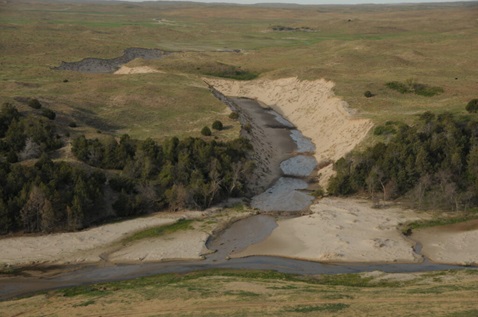The U.S. Environmental Protection Agency (EPA) has approved a work plan submitted to the Agency by Richard Minor of Gordon, Nebraska, and Cherry County, Nebraska, to mitigate damage to the Snake River resulting from an unauthorized drainage ditch excavated from Minor’s property to the river in 2020.
According to EPA, discharges from the ditch into the river caused extensive environmental harm and violated the federal Clean Water Act.
“The Snake River is a critical aquatic resource,” said David Cozad, director of EPA Region 7’s Enforcement and Compliance Assurance Division. “EPA is encouraged that Mr. Minor and Cherry County are taking steps to minimize further impacts to the Snake River and downstream property owners.”
According to EPA, in April 2020, Minor and Cherry County personnel excavated the drainage ditch to the Snake River to alleviate flooding, without first obtaining the required Clean Water Act permits.
Within days of completing the approximately 2½-mile ditch, rainfall rapidly eroded it, which resulted in massive amounts of sand being deposited into the Snake River. EPA says that millions of tons of sediment have flowed into the river since the ditch excavation.
Under an Administrative Compliance Order filed with EPA on June 14, 2021, Minor and Cherry County agreed to submit a work plan to mitigate the damage. After multiple delays by Minor and the county, EPA recently received an acceptable work plan, which was approved and finalized on Feb. 22, 2024.
EPA says that implementation of the work plan will take approximately one year, and will include:
· The placement of downed trees and woody debris to construct sediment trap structures along the ditch.
· Construction of earthen berms to prevent excessive flow of water and sediment.
· The placement of a series of woody debris fences and log structures along the ditch to trap sediment and create wildlife habitat.
· The installation of a riparian corridor, consisting of native species along sections of the River.

